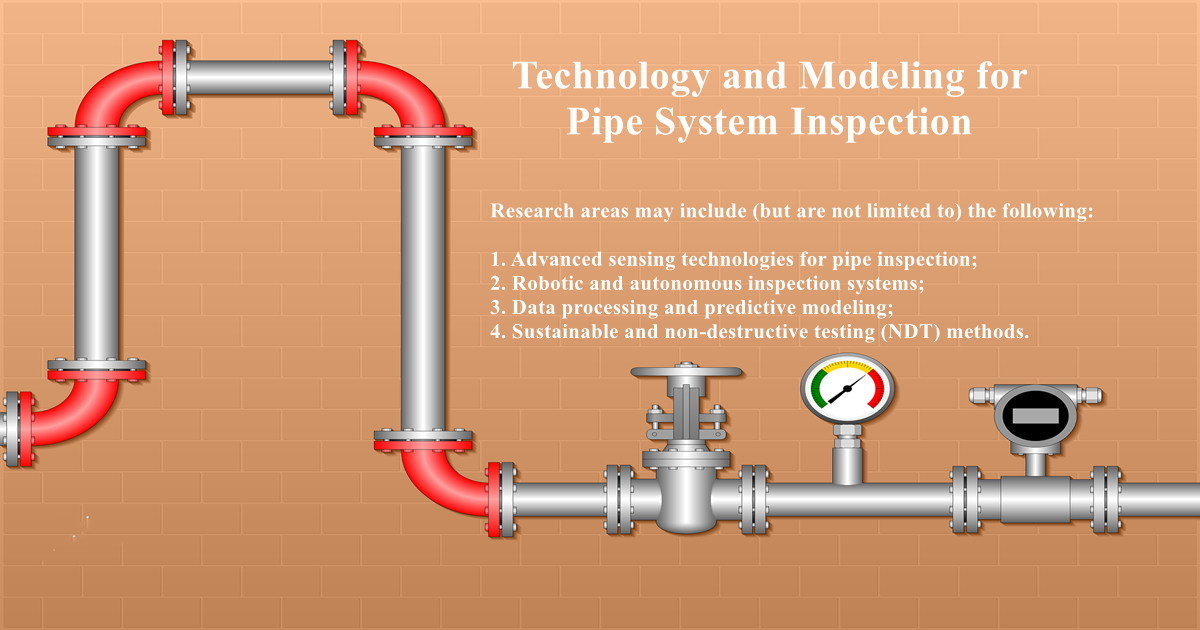- 2.5Impact Factor
- 5.5CiteScore
- 20 daysTime to First Decision
Technology and Modeling for Pipe System Inspection
This special issue belongs to the section “Civil Engineering“.
Special Issue Information
Dear Colleagues,
Pipe systems are critical infrastructure components widely used in water supply, oil and gas transportation, wastewater management, and industrial processes. Ensuring their integrity and efficiency is essential to prevent leaks, contamination, and catastrophic failures. However, inspecting these systems—especially those that are buried, submerged, or otherwise inaccessible—poses significant technical challenges. Advances in sensor technologies, robotics, artificial intelligence, and predictive modeling have revolutionized pipe inspection, enabling more accurate, efficient, and cost-effective diagnostics. This Special Issue seeks to compile cutting-edge research on innovative inspection technologies and computational models that enhance the reliability, safety, and sustainability of pipe systems.
We are pleased to invite you to submit your latest research findings to this Special Issue. This Special Issue aims to provide a comprehensive overview of emerging technologies, methodologies, and modeling approaches for pipe system inspection, fostering interdisciplinary collaboration among researchers in civil engineering, mechanical engineering, robotics, data science, and environmental science
Suggested Themes and Article Types for Submissions:
In this Special Issue, original research articles and reviews are welcome. Research areas may include (but are not limited to) the following:
- Advanced sensing technologies for pipe inspection;
- Robotic and autonomous inspection systems;
- Data processing and predictive modeling;
- Sustainable and non-destructive testing (NDT) methods.
We look forward to receiving your contributions and advancing the state of the art in pipe system inspection together.
Prof. Dr. Bruno Brunone
Guest Editor
Manuscript Submission Information
Manuscripts should be submitted online at www.mdpi.com by registering and logging in to this website. Once you are registered, click here to go to the submission form. Manuscripts can be submitted until the deadline. All submissions that pass pre-check are peer-reviewed. Accepted papers will be published continuously in the journal (as soon as accepted) and will be listed together on the special issue website. Research articles, review articles as well as short communications are invited. For planned papers, a title and short abstract (about 250 words) can be sent to the Editorial Office for assessment.
Submitted manuscripts should not have been published previously, nor be under consideration for publication elsewhere (except conference proceedings papers). All manuscripts are thoroughly refereed through a single-blind peer-review process. A guide for authors and other relevant information for submission of manuscripts is available on the Instructions for Authors page. Applied Sciences is an international peer-reviewed open access semimonthly journal published by MDPI.
Please visit the Instructions for Authors page before submitting a manuscript. The Article Processing Charge (APC) for publication in this open access journal is 2400 CHF (Swiss Francs). Submitted papers should be well formatted and use good English. Authors may use MDPI's English editing service prior to publication or during author revisions.
Keywords
- pipe system inspection
- advanced sensing technologies
- robotic inspection systems
- AI and machine learning
- predictive modeling
- non-destructive testing (NDT)
- digital twin
- IoT and smart pipeline management
- corrosion and wear monitoring
- sustainable inspection methods

Benefits of Publishing in a Special Issue
- Ease of navigation: Grouping papers by topic helps scholars navigate broad scope journals more efficiently.
- Greater discoverability: Special Issues support the reach and impact of scientific research. Articles in Special Issues are more discoverable and cited more frequently.
- Expansion of research network: Special Issues facilitate connections among authors, fostering scientific collaborations.
- External promotion: Articles in Special Issues are often promoted through the journal's social media, increasing their visibility.
- e-Book format: Special Issues with more than 10 articles can be published as dedicated e-books, ensuring wide and rapid dissemination.

